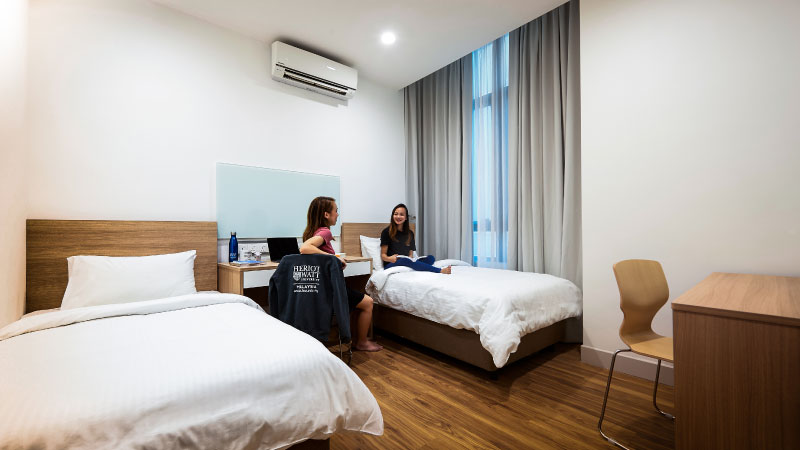"Can I Change My Course In Uni?" And 7 Other Common Questions Asked By Students
Students and parents, read this before applying for your uni course!
Whether you're a student applying for university, or a parent worried about your child's education, we all know that deciding what and where to study can be really stressful
From the thousands of courses offered, to the hundreds of institutions available, there's a lot to think about when it comes to choosing what and where to study.
Thankfully, Heriot-Watt University Malaysia wants to guide students who don't know what to do in the future, or may need help aligning their aspirations with their studies.
Through Heriot-Watt's flexible foundation courses and Fit-For-Future programme, you'll discover how to unlock your potential, while having the freedom to explore different programmes of study worry-free.
Keep reading to find out why Heriot-Watt could be the university of choice for you.
To help ease your worries about university, we answer some of the most commonly asked questions by students:
1. Can I change my course in university?
The short answer is yes. Most universities will allow you to transfer between the same course level, for instance from foundation programme to another foundation programme.
However, changing courses midway through university may cost you time and money. Depending on which course you take, there may be a chance you can transfer relevant credits, but sometimes you'll have to start from scratch. If you change course, you'll likely also be 'wasting' the fees for that specific semester.
That's why you should always do your research before choosing your course in university. If you're unsure what programme you're suited for, meet up with a counsellor, take a career assessment, or talk to people in different industries to see where you fit.
2. Do I need a foundation programme before going into degree?
A foundation programme is usually a 12-month pre-university course that is meant to help you transition smoothly into a degree programme. Each foundation course consists of core and elective subjects that prepare you for university, while allowing you to explore different pathways.
One important thing to note is that foundation programmes differ from one university to another. That's why most foundation students tend to progress to their degree studies at the same institution.
Compared to other pre-university courses, a foundation programme is usually faster, more affordable, and gives you the flexibility to take up various topics of interest.
3. When should I start applying for university?
Once you've gotten your SPM results or equivalent, you can start applying to universities. Intakes will differ based on the course and institution you choose. For instance, Heriot-Watt University Malaysia offers three intakes for their foundation programme – April, July, and September.
While the deadline for applications is usually two weeks before the semester start date, students are advised to apply earlier to secure their spot. For those of you looking to get scholarships, early fee waivers, or credit transfers, you'll most likely need to send in your applications a few months your semester starts.
Take note of all the deadlines by looking up the university's academic calendar or semester dates.
4. How do I get scholarships or financial aid?
There are few different kinds of scholarships available in Malaysia, and they are usually offered by government agencies, private institutions, and various organisations. The scholarships can range from partial to full scholarships, with some of them requiring the student to be bonded.
When it comes to applying for scholarships, the key is to do your research and be proactive. Since many scholarships are repeated annually, try to find out when a particular scholarship is typically announced. Next, send in your application on time with all the required documents.
Besides that, you should also talk to seniors, teachers, and counsellors about scholarships offered by the university itself. Some schools give out scholarships based on your SPM results, so don't miss out.
5. I don't know what to study yet. What is a safe option?
Two of the most common options are Foundation in Business and Foundation in Science.
Foundation in Business prepares you for a wide range of majors, including Finance, Accounting, Business Administration, Marketing, and International Business. It is one of the quickest pathways to get into a business-related degree.
Foundation in Science, on the other hand, covers many different subjects like science, math, English, IT, and more. While it prepares you for science-related degrees, a Foundation in Science is flexible – you should be able to easily switch to non-science degrees if you want to.
6. Should I stay on-campus or at my own place?
There are pros and cons to staying on-campus. The good thing is that you won't have to worry about commuting to school, you can make use of all the facilities, and you'll get to enjoy the full university experience away from home.
However, staying on-campus is typically a bit more expensive. Nowadays, you should be able to find plenty of accommodation options within the vicinity of your university. If you're renting a room, do ensure that it has good public transport connectivity and is surrounded by basic amenities.
With online classes currently being implemented at most universities, studying from home is also an option worth considering.
7. Is it recommended to work part-time during university?
There are various ways to earn some extra cash during university, from mall events and focus groups, to student jobs and paid internships. The key is learning to strike a balance between your work and studies. If you're missing assignment deadlines because of work, that's a sign that you need to relook into your priorities.
While you can work more hours in your first year, you'll probably need to slow it down as you progress in your course, because you'll be spending more time doing research and revision.
If possible, look for internships or freelance jobs that fit with your programme of study. This helps you gain relevant experience, while building your network.
8. What should I look for in a university?
One of the most important things you need to check when applying for a university is if the courses are accredited by the Malaysian Qualifications Register (MQA). This assures that you are getting quality education, while ensuring that you are eligible to apply for a PTPTN loan and work for the government.
Besides that, you need to factor in the cost, location, study environment, and the prestige of your institution. If you are still unsure even after doing your research, the best thing to do is talk to students or alumni from those universities.
Ultimately, going to university is a once-in-a-lifetime experience, and you want the best education to prepare you for a successful career
While you may still have questions about going to uni, Heriot-Watt University Malaysia wants to walk you through every step of the way
Heriot-Watt is one of UK's top-ranked universities, with five global campuses, 28,000 students worldwide, and a history dating back to 1821. The Malaysian campus is based in Putrajaya, offering close proximity to extensive cultural, leisure, and retail amenities for your convenience.
Besides that, Heriot-Watt offers courses that are designed to equip you intellectually, while building emotional resilience necessary in today's environment.
The great thing about Heriot-Watt is that they provide flexible foundation programmes that cater to your individual needs
Flexible Restart
Students in the July 2021 intake will have the flexibility to "restart" their foundation studies in the September 2021 intake at no additional cost. Whether you're struggling to cope, or you want to change your programme of study, this flexibility allows you to start your tertiary studies worry-free.
Flexible Fees
Heriot-Watt understands that tuition fees may incur a large commitment, so they've come up with flexible fee plans to ease your burden. You can opt to pay tuition fees over six instalments, or pay the first semester fees in full to receive an early bird waiver of RM4,000, while it's available. Plus, they are offering a 70% refund of tuition fees for students who decide to withdraw by 30 August 2021.
Flexible Studying
Heriot-Watt applies a unique studying mode called Responsive Blended Learning, combining active, supported online learning with contextually appropriate face-to-face learning opportunities, responding dynamically to the changing external context. All in all, you can enjoy flexible location of study, flexible entry, and flexible study plans.
Heriot-Watt is now accepting applications for their July 2021 intake. Find out more about their Foundation in Business and Foundation in Science programmes today!











